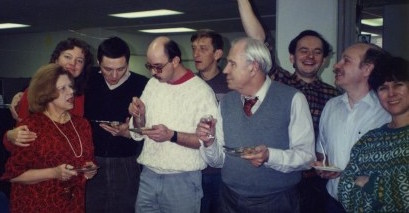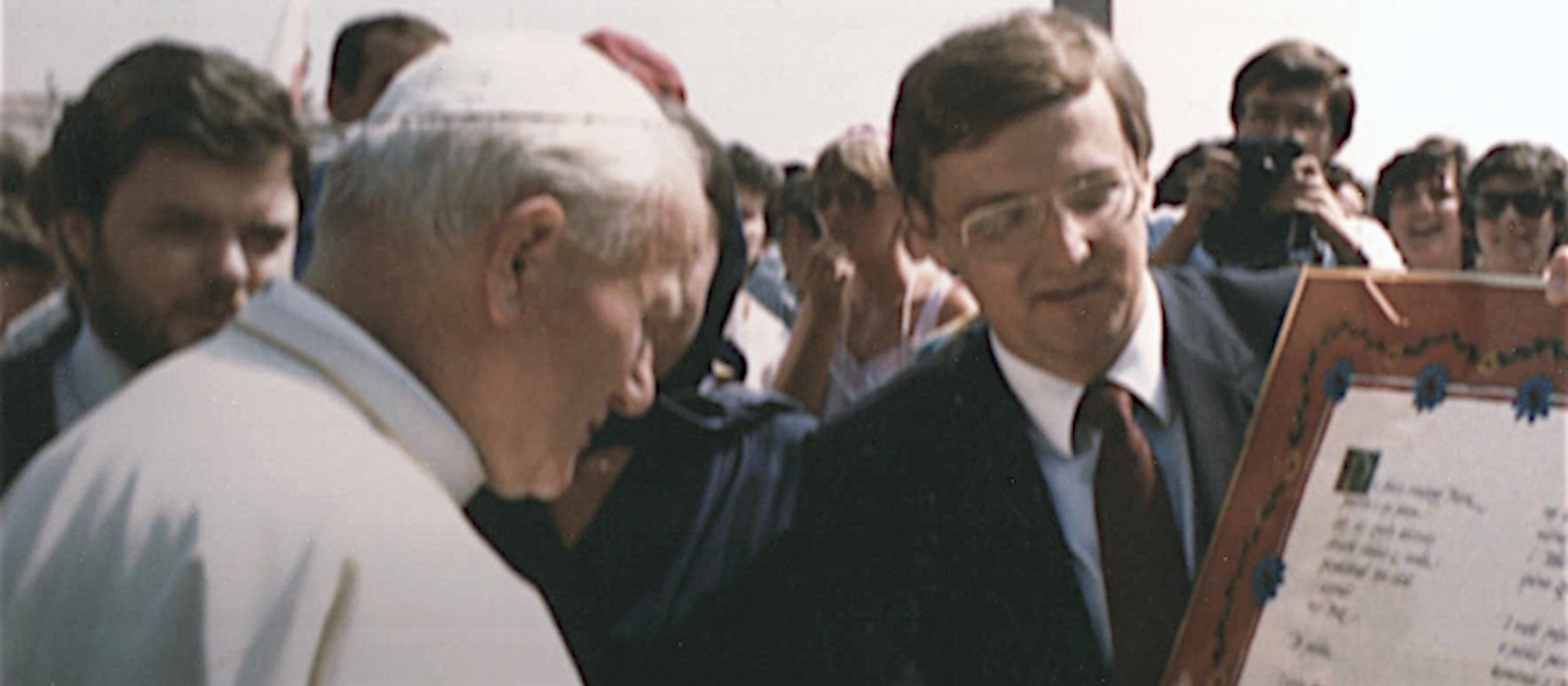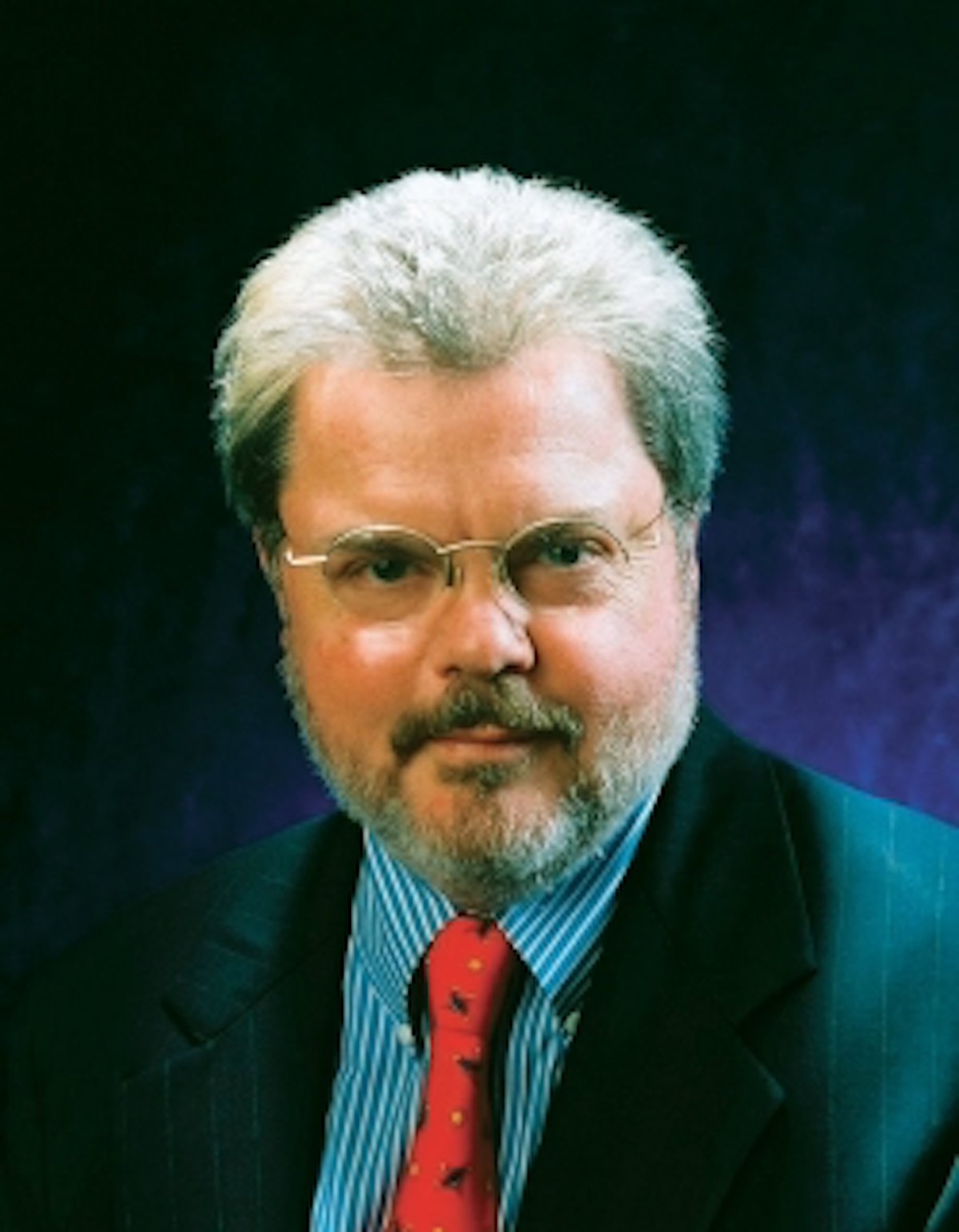Cold War Radio Museum Voice of America (VOA) Polish Service director Ted Lipien and VOA English Service correspondent Wayne Corey interviewed the then Vice President George H.W. Bush on September 24, 1987 in his office in Washington shortly before his trip to Italy to see Pope John Paul II and to Poland to confer with government and opposition leaders.…

Voice of America Polish Service Broadcaster Irene Broni Resisted Nazis and Communists
By Ted Lipien Voice of America Polish Service Program “All About America” (Ameryka w Przekroju), July 9, 1983 Irena Radwańska Broni: Returning to the U.S. citizenship oath ceremony at Monticello, Thomas Jefferson would certainly approve of using his home for this purpose. … Thomas Jefferson wrote: “Born in other countries, yet believing you could be happy in this, our laws…
MSZANA DOLNA NA 150-TĄ ROCZNICĘ NIEPODLEGŁOŚCI STANÓW ZJEDNOCZONYCH
Tadeusz Lipień
4-go lipca Ameryka obchodziła Dzień Niepodległości. Ten szkic ma na celu przypomnienie jak mieszkańcy międzywojennej Rzeczypospolitej obchodzili w 1926 r. w wyjątkowy sposób 150-tą rocznicę podpisania amerykańskiej Deklaracji Niepodległości. Włączyłem do niego także osobiste wspomnienia o moich krewnych i innych mieszkańcach mojej rodzinnej miejscowości Mszany Dolnej, którzy w 1926 r. przesłali specjalne życzenia narodowi amerykańskiemu.

Województwo Lubelskie; Polskie deklaracje szacunku i przyjaźni dla Stanów Zjednoczonych: przedstawiciele województw i okręgów, organizacje prowincjonalne, instytucje wojskowe, organizacje społeczne, wydziały i studenci instytucji akademickich; Tom 2; Kolekcja Biblioteki Kongresowej; 1926 r.
Read in English: “History’s Greatest Fourth of July Birthday Card: A Personal Story of Polish-American Friendship“
Op-Ed: Voice of America in intellectual twilight zone against Putin | Digital Journal
By Ted Lipien Published August 12, 2015 in Digital Journal The Voice of America, one of America’s taxpayer-funded weapons against Russian propaganda, had something in common with Russia’s propaganda weapon RT last week. RT (formerly Russia Today), a multimedia English-language website, still looked vastly more polished, more frequently updated and far more visually appealing than VOA’s late 20th century GI (Government…
Warsaw Uprising Betrayed by Pro-Stalin WWII Voice of America

August 1, 2019 is the 75 anniversary of the start of the Warsaw Uprising, a 63-day unsuccessful operation by the Polish resistance Home Army (Polish: Armia Krajowa) to liberate Warsaw from Nazi German occupation. About 16,000 Polish fighters were killed and between 150,000 and 200,000 Polish civilians died, mostly from mass executions. After the Home Army capitulation in Warsaw, the Germans expelled from the city the entire civilian population. Thousands of the evacuees were sent to Nazi concentration or labor camps. The city was almost completely destroyed during the fighting and after the uprising in a deliberate German action of blowing up buildings.
But in line with Stalin’s negative view of of Polish anti-Nazi fighters who were not pro-Soviet Communists, World War II U.S. Voice of America radio broadcasts largely ignored the 1944 Warsaw Uprising, while most Americans and even President Franklin D. Roosevelt, who caved in to nearly all of Stalin’s demands, expressed support for the Poles’ fight for freedom. VOA’s early news writers, including future Stalin Peace prize winner, American Communist Howard Fast, did not practice journalism in the style of CBS wartime radio reporter Edward R. Murrow. They followed in the footsteps of Pulitzer Prize-winning New York Times Moscow correspondent Walter Duranty who, because of his pro-Soviet and pro-communist bias, shamelessly lied about the starvation and death of millions of people in Ukraine and in other parts of the Soviet Union under Stalin’s rule.
Some of Soviet sympathizers and Communists were hired by VOA’s first director John Houseman, a future Hollywood Oscar-winning actor. The U.S. State Department and the U.S. Military Intelligence quietly forced him to resign in 1943 with the approval from the FDR White House, but many of his Communist hires remained until at least 1945. Some stayed on for a few years longer. Some went back to Eastern Europe to work as propagandists and diplomats for Soviet-dominated communist regimes.
But a different view of early Voice of America radio broadcasts was presented by current VOA director Amanda Bennett in a recent Washington Post op-ed: “Those broadcasts were lifelines to millions. Even more important, however, was the promise made right from the start: ‘The news may be good for us. The news may be bad,’ said announcer William Harlan Hale. ‘But we shall tell you the truth.’” Bennett insisted that Edward R. Murrow helped to create VOA. Based in London and working for CBS, he had absolutely no role and no influence over wartime VOA dominated by admirers of Stalin and the Soviet Union. Unlike early VOA officials and broadcasters, Murrow was not a journalist to be easily fooled by Soviet propaganda. 1
It took Zofia Korbońska, Irene Broni (Irena Radwańska), Zdzisław Dziekoński, Jan Grużewski, Wacław Bniński and other VOA Polish Service Cold War era broadcasters and journalists who were former Warsaw Uprising fighters many years to undo the damage done by Soviet agents and sympathizers who had taken control of U.S. international broadcasting during World War II. Another VOA Polish Service broadcaster, my deputy Marek Walicki, witnessed the Warsaw Uprising as a young boy. Eventually, with the help of these journalists, VOA was perceived in Poland as a symbol of America’s commitment to freedom and democracy, but it required a change of staff, a change of management and a new vision for the organization that previously had betrayed American values.
The 1944 Warsaw Uprising was doomed because Stalin halted the Red Army offensive to allow the Germans to kill and crush anti-Communist Poles. As a result of concessions made by Roosevelt to Stalin and the presence on the ground of Red Army troops Poland fell under Soviet domination and communist oppression for nearly five more decades. The early Voice of America did not only betray Warsaw Uprising fighters and Poland, it betrayed more than 80 million people in all the nations which fell under Soviet rule.
During the Cold War, the Voice America eventually redeemed itself and broadcast truthful news behind the Iron Curtain. President Ronald Reagan paid tribute to former anti-Nazi Warsaw Uprising fighters, including those who later worked in the VOA Polish Service. During World War II, however, VOA Polish radio broadcasts prepared by admirers of Stalin and Communism, were filled with Soviet propaganda and hostile toward those who did not want to accept Stalin’s rule. They even largely ignored the Holocaust because Soviet propaganda, which they promoted, focused on the suffering and sacrifices of Soviet soldiers and civilians rather than the plight of Jews or other groups and nationalities. Some of the early OWI journalists, including Stefan Arski, a.k.a. Artur Salman, and Adolf Hofmeister, went to work for communist regimes in East-Central Europe. Before they left, these Soviet sympathizers and agents of influence made the life of a few honest VOA journalists extremely difficult. A VOA Polish Service broadcaster Konstanty Broel Plater resigned in 1944 rather than be forced to read Stalin’s propaganda lies to German-occupied Poland. Under Secretary of State Sumner Welles, who was one of the most liberal members of President Roosevelt’s cabinet, in 1943 sent a secret memo to the White House with a warning that pro-Soviet fellow travelers and Communists employed in the Office of War Information have shown “bitter hostility” even toward “a considerable number of officials in the United States Government who are deemed inconvenient.” 2
This article, originally written in 2015, was updated for the 75th anniversary of the Warsaw Uprising.
Notes:
- Amanda Bennett, Voice of America Director, “Trump’s ‘worldwide network’ is a great idea. But it already exists.” The Washington Post, November 27, 2018, https://www.washingtonpost.com/opinions/trumps-worldwide-network-is-a-great-idea-but-it-already-exists/2018/11/27/79b320bc-f269-11e8-bc79-68604ed88993_story.html. ↩
- Under Secretary of State Sumner Welles April 6, 1943 memorandum to Marvin H. McIntyre, Secretary to the President with enclosures, Franklin D. Roosevelt Library and Museum Website, Box 77, State – Welles, Sumner, 1943-1944; version date 2013. State – Welles, Sumner, 1943-1944, From Collection: FDR-FDRPSF Departmental Correspondence, Series: Departmental Correspondence, 1933 – 1945 Collection: President’s Secretary’s File (Franklin D. Roosevelt Administration), 1933 – 1945, National Archives Identifier: 16619284. ↩
Op-Ed: Kudos to RFE/RL | Digital Journal
By Ted Lipien Published July 31, 2015 in Digital Journal Radio Free Europe / Radio Liberty (RFE/RL) is one of America’s best investments in peaceful backing of freedom abroad, which brings security at home. Funded by U.S. taxpayers through the Broadcasting Board of Governors (BBG), RFE/RL “serves as a ‘surrogate’ free press in 21 countries where the free flow of information is either…
Op-Ed: Murder of Polish priest may offer clues in Boris Nemtsov’s case | Digital Journal
By Ted Lipien Published March 3, 2015 by Digital Journal Authoritarian, corrupt or rogue regimes, their leaders, and their beneficiaries often behave in similar ways in different countries. They fear their democratic opponents and rely on the secret police to keep themselves in power through monitoring, intimidating, jailing and sometimes killing those who may challenge their repressive rule. Although Poland…
Jerzy Popiełuszko – Vice President George H.W. Bush Visits Slain Priest’s Grave, Poland 1987
During his visit to Poland in September 1987, U.S. Vice President George H.W. Bush took part in a wreath-laying ceremony for Father Jerzy Popieluszko at the St. Stanislaw Kostka Church in Warsaw (September 28, 1987). Voice of America VOA Polish Service director Tadeusz (Ted) Lipien reported on the visit from Warsaw.
Tomlinson on Voice of America coverage of Pope John Paul II
 Former Voice of America (VOA) director and former Broadcasting Board of Governors (BBG) Chairman Ken Tomlinson, who died recently, told Voice of America two years ago that his most memorable moment at VOA was to visit the Polish Service and help arrange extensive news coverage of Pope John Paul II’s visit to Poland when the country was still under communist rule during the Cold War. The Pope’s visit to Poland helped the suppressed Solidarity trade union to intensify its peaceful struggle for democracy and eventually resulted in the fall of communism. Father Stefan Filipowicz, a Chicago-based Jesuit priest and former director of the Polish Service at Vatican Radio, provided religious commentary from a VOA studio in Washington during the coverage of the papal visit. Live audio transmission from Poland was provided to VOA by Vatican Radio.
Former Voice of America (VOA) director and former Broadcasting Board of Governors (BBG) Chairman Ken Tomlinson, who died recently, told Voice of America two years ago that his most memorable moment at VOA was to visit the Polish Service and help arrange extensive news coverage of Pope John Paul II’s visit to Poland when the country was still under communist rule during the Cold War. The Pope’s visit to Poland helped the suppressed Solidarity trade union to intensify its peaceful struggle for democracy and eventually resulted in the fall of communism. Father Stefan Filipowicz, a Chicago-based Jesuit priest and former director of the Polish Service at Vatican Radio, provided religious commentary from a VOA studio in Washington during the coverage of the papal visit. Live audio transmission from Poland was provided to VOA by Vatican Radio.
Ken Tomlinson and his wife Rebecca later traveled to Rome with VOA Polish Service director Ted Lipien to meet Pope John Paul II who thanked the Voice of America for broadcasting news to his countrymen in Poland under communism.
Thanks to Ken Tomlinson’s support, funding from the Reagan administration and full bipartisan backing in the U.S. Congress, the Polish Service became one of the most successful language services in the history of VOA, with over 70% weekly audience reach in Poland in the late 1980s.

Ted Lipien remembers Ken Tomlinson
I met Ken Tomlinson for the first time in 1982 when he became Voice of America director and I was in charge of VOA broadcasts to Poland. Ken asked me what the Polish Service needed to expand its news coverage and later made sure we got everything we wanted: more employees in Washington and reporters in the U.S., more overseas correspondents and stringers, more money to cover Solidarity-related news stories in the U.S. and in Europe.
Ken Tomlinson understood that the Polish Service was at that moment in VOA’s history the key to the success of its mission. Our audience grew to over 70 percent of the population and at the end communism in Poland collapsed and democracy was peacefully restored. There is no doubt that Ken Tomlinson, the Voice of America, and especially Radio Free Europe and Radio Liberty, helped Ronald Reagan bring down “the evil empire” faster than it would have happened otherwise.
Still during the martial law in Poland in the 1980s, I traveled with Ken and his wife Rebecca to Rome to meet Pope John Paul II. It was a brief meeting at a general audience, but the Pope showed a lot of interest in our work and asked a few questions. He thanked us for VOA news broadcasts to his beloved country.